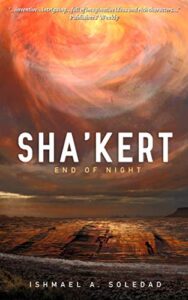Sha’kert: End of Night by Ishmael Soledad
Temple Dark Publications, 2021
ISBN: 9781685132040
Available: Paperback, Kindle edition
The future.
The polar ice caps have melted.
Those who survived…(whoops, that was Waterworld. Let me try again)
The future.
The Amish have crash-landed on a distant planet.
Those who survived…have adapted to a new world.
That’s the odd but entertaining genesis of Sha’kert, one of the more unusual sci-fi books of the past few years. It’s a creative, enjoyable read for fans of human conflict stories, brought down only a bit by a somewhat muddled ending.
It’s important to note that this is not a survival story in the same style of masterpieces like Verne’s Mysterious Island and Defoe’s Robinson Crusoe. There’s little detail concerning how the characters survive on a new world, while starting with minimal supplies. The story’s focus is the conflict between the Amish and another family that survived the crash, consisting of Greg, his wife Louise, and their daughter Penny. They aren’t Amish, but are the typical modern, tech-obsessed, cell phone-crazed family. A doubting Amish youth, Henry, also contributes as a character who is sort of in the middle. It’s the discord between old and new ways that the author concentrates on and he does a good job of it, presenting both sides without sounding preachy or political. In the story, all the characters need each other at first to survive, but once they get established and survival is ensured, strife ensues over the possibility of outside contact. Greg and Henry want to explore the planet in hope of finding others, while most Amish would prefer to have no contact with anything or anyone, preventing their being influenced by outside ideas. It’s why the left Earth in the first place: dealing with outsiders was becoming unavoidable. To the author’s credit, all the characters have viewpoints reasonably presented, and the book avoids coming off as biased towards either old or new ways. It’s an engrossing story of personal convictions, and the problems that stem from the inability to compromise.
It’s only the last quarter of the book that is a bit of a letdown. The communication between the characters and what they are trying to convey gets somewhat confusing, and the plot wanders away from the original premise with a new religious angle that doesn’t fit with the rest of the book. The story could have been wrapped up in a neater, less metaphysical fashion.
Bottom line: this is a good sci-fi tale that does well when it stays on focus, and has more meaning and material worth pondering over then the standard science fiction novel. Recommended.
Reviewed by Murray Samuelson.






Follow Us!